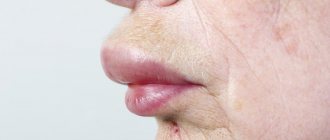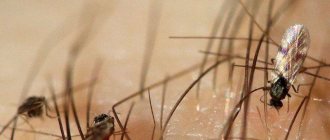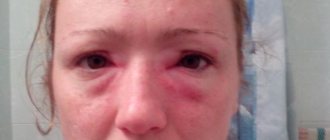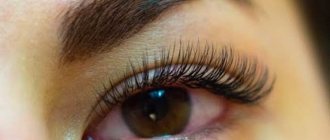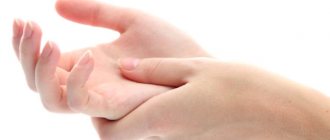Swelling of any part of the face or mouth is not only a strong aesthetic defect, but also a possible symptom of the development of the disease. The reasons can be very diverse and it is not always necessary to treat them with medication and consult a doctor, but an examination will reduce the likelihood of missing something important, if any. When your lower lip is swollen, try to figure out the root of the problem yourself, and if that doesn’t work, then seek help. This could be an inflammatory process, banal chapping, an allergic reaction, or a consequence of going to an inexperienced dentist.
Causes of swelling of the upper lip
Before starting treatment, it is important to determine the cause of the swelling.
This could be an allergic reaction, traumatic damage to the mucous membrane, inflammatory processes in the oral cavity, or infections. Each disease has its own characteristics. Most often, if the lips are swollen, the cause is injury:
- Mechanical. These include the habit of biting lips, bruises, piercings and tattoos.
- Thermal. Occurs due to a burn of the mucous membrane or skin. For example, when drinking too hot drinks or foods.
- Chemical. Swelling appears after contact with chemicals - acids or alkalis, as well as poisons from insect bites.
Making a diagnosis is simple - you need to establish that an injury occurred the day before (piercing, bruise, tattoo, burn, etc.). In addition to edema, the consequences of traumatic injuries are determined - hematomas, defects, pain.
Swelling of the lips can be caused by a severe allergic reaction - Quincke's edema. This is a condition that threatens a person's life.
The disease is characterized by sudden swelling of the lips, perioral area and face. Symptoms occur upon contact with an allergen. Edema can be caused by:
- insect bite - bee, wasp, bumblebee;
- food (especially nuts, citrus fruits, strawberries);
- medications;
- cosmetics.
The disease is often accompanied by other symptoms - numbness, itching in the swollen area.
Herpes
Another common cause of swelling is recurrent herpes. Herpes often develops in areas that contain a lot of loose connective tissue. Acute development of symptoms is characteristic. The main symptom of herpes is a rash in the form of blisters. Additionally, swelling appears in the areas of the rash. After 2-3 days, the blisters burst and painful erosions appear in their place.
Herpes is a chronic disease, so even after treatment, symptoms appear again. This is facilitated by hypothermia, systemic infections, and decreased immunity.
Erysipelas
Erysipelas is characterized by both local and general symptoms. The cause of erysipelas is beta-hemolytic streptococcus. Local symptoms include:
- swelling of the lips and face;
- skin redness;
- severe pain;
- clear boundaries between healthy and diseased tissue.
Other areas of the skin, such as the lower extremities, may also be affected. Often general symptoms come to the fore - fever, weakness, chills, headache.
Complicated caries
Swelling of surrounding tissues can occur as a complication of caries. For example, with purulent periodontitis, pulpitis.
A distinctive feature is toothache, which arose several days before the swelling. In addition to swelling, soreness, redness of the mucous membrane and skin, as well as general signs of inflammation are determined - increased body temperature, enlarged regional lymph nodes.
In most cases, lip swelling goes away on its own after treatment of the underlying disease. Additionally, local remedies can be used - ointments, compresses, folk recipes.
The main treatment for swelling is determined by the cause that led to its development. For each specific disease, treatment approaches differ. There is no universal method that would get rid of swelling in all cases.
Folk remedies
If swelling occurs suddenly, and there is no opportunity to see a doctor immediately, you can use folk remedies. They will help relieve swelling, but will not completely eliminate the disease.
What you can use at home:
- Aloe. Aloe juice has anti-inflammatory and anti-edematous effects. A cotton pad should be soaked in juice and applied to the swollen area for 30 minutes.
- Soda. Baking soda should be diluted with water in equal quantities. The resulting paste is applied to the site of swelling for 10 minutes, then washed off with water.
- Parsley. A cotton swab or piece of gauze should be moistened in a decoction of parsley (1 teaspoon of parsley per 1 glass of water) and applied to the swollen area.
- Plantain. Plantain leaves need to be crushed and applied to the swollen area for 20 minutes.
Cold compresses can be used to relieve swelling. To do this, soak a piece of gauze in cold water and apply it to your lips. You can also use ice placed on top of the fabric.
The causes of swelling of the upper lip in some cases can be determined by carefully studying the patient’s complaints and assessing the nature and appearance of the defect.
In this case, attention is usually paid to the following aspects:
- Symmetrical swelling;
- Manifestation of swelling in other areas: lower lip, gums, tongue, teeth and nose;
- Preservation of sensitivity;
- Associated sensations of pain, itching or burning.
If a person has a sharply and unexpectedly swollen upper lip, the reasons are most often associated with:
- Trauma to the mucous membrane or traumatic dental procedures;
- Inflammatory purulent processes of the oral cavity or nose;
- Local herpetic lesion;
- Generalized infectious disease, especially of a viral nature;
- Obsessive lip biting.
The listed conditions (with the exception of bruises and obsessive movements) are accompanied by a decrease in the level of immune defense.
Edema is the body’s reaction to any irritant and mechanical impact. The symptom may also indicate the development of certain diseases.
The main causes of swelling of the upper lip.
- Allergic reaction. It is characterized by the body's hypersensitivity to a particular irritant (dust, plant pollen, animal hair, medications, food, etc.). The reaction occurs immediately after contact with the allergen or after 3-6 hours. In addition, accompanying symptoms are observed in the form of lacrimation, runny nose, and red eyes.
- Inflammatory process.
- Herpes.
- Poor-quality decorative cosmetics, violations of hygiene rules.
- Dental diseases, stomatitis, teething, gumboil. If the cheek is swollen along with the upper lip, then the main cause of the symptom is periodontitis. The disease is a complication of dental injuries, caries and poorly performed dental procedures. As a result, the inflammatory process spreads to the cheek and lip. In this case, severe pain is felt in the area of the affected tooth, swelling of the gums, and an increase in body temperature are observed.
- Infectious or viral disease against a background of high body temperature, consequences of hypothermia, frostbite, hot weather.
- Neuritis of the facial nerve. Accompanied by swelling and numbness of the upper lip.
- Surgeries (facial plastic surgery) and injuries (biting the upper lip, damage to the lip with a toothpick, dental floss, piercing, burn).
If swelling of the upper lip is accompanied by pain, then an inflammatory process may develop due to injury, the presence of ulcers, cystic acne, wounds, and abrasions. Painful sensations may be associated with an infectious process. After all, abrasions and open wounds are an excellent environment for germs to enter and multiply.
When the upper lip swells from the inside, periostitis develops - an inflammatory process in the periosteum and bone jaw tissues. Complicated by suppuration, abscesses, tissue necrosis. The causes of the disease are improper dental procedures, improper antiseptic treatment, and installation of fillings. Swelling of the lip is accompanied by redness and swelling of the gums.
In children, a symptom may appear due to the development of stomatitis, an allergic reaction, pathological lesions of the teeth and gums, bruises, and malfunctions of the gastrointestinal tract.
Useful: List of antibiotics for colds in adults
Just as in the case of the upper lip, the following are the causes of swelling of the lower lip.
- Allergy.
- Injury.
- Development of pathologies.
Pathological factors include infectious and non-infectious diseases. This:
- ARVI, acute respiratory infections, herpes;
- Quincke's edema;
- lichen, fungus;
- obesity;
- lip cancer;
- stomatitis;
- cheilitis (a rare inflammatory disease of the mucous membrane and red border of the lips);
- malignant tumors.
An allergic reaction occurs to food, medications, and cosmetics. Accompanied by swelling and numbness of the lower lip.
Traumatic factors include:
- constant lip biting;
- burns resulting from exposure to ultraviolet radiation after consuming hot drinks and food;
- blow, scratch, puncture;
- bruise, bite;
- piercing, tattooing, permanent makeup, surgery, anesthesia.
A deficiency of vitamin B and C leads to swelling of the lower lip. Vitamin deficiency occurs due to fasting and adherence to strict one-component diets.
An increase in the area under the lip may indicate the development of aphthous stomatitis (inflammation of the oral mucosa), fibroma (benign neoplasm), and angioedema (Quincke's).
If the swelling affects both the lip and chin, this indicates an abscess of the lower jaw caused by injury to the dental pulp.
Swelling on the inside of the lip indicates blockage of the salivary glands. A symptom appears when you frequently bite your cheeks, lips, or have piercings.
The cause of lip swelling can be fluid retention in the body (usually observed during pregnancy), blood transfusion, liver, kidney, heart and vascular diseases. In this case, the symptom extends not only to the lower lip, but also to the upper lip.
Swelling caused by a bruise or injury (without cracks or abrasions) is eliminated by applying a cold compress, always wrapped in a clean cloth. They hold it for a quarter of an hour. The compress allows you to slow down the flow of blood to the damaged area and quickly relieve swelling and relieve pain.
How to relieve swelling of the lip in the presence of abrasions and wounds? Fresh aloe leaf is used. It is cut in several places and applied to the sore lip for 5-7 minutes. The plant will relieve inflammation, disinfect and remove swelling.
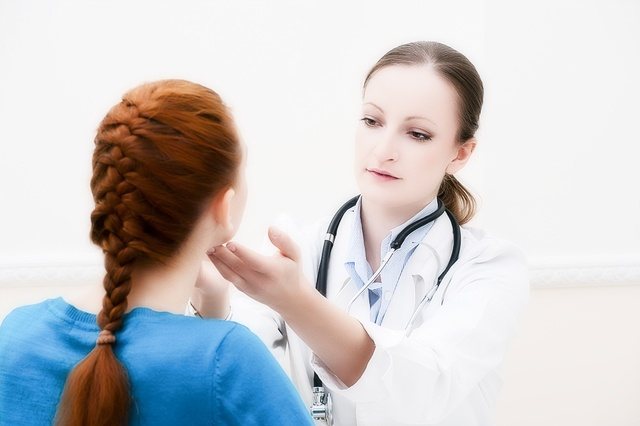
A warm tea bag and tea tree oil will help restore your lip to its original appearance.
All these manipulations are performed immediately after the swelling appears and serve as first aid elements.
How to act in each case
When a tumor appears on the lips, it is impossible to fight the problem without finding out the cause of its occurrence. Incorrectly used medications and seemingly “harmless” folk remedies can only aggravate the problem. The only thing you can do yourself is to treat the affected area with an antiseptic.
Mechanical damage
To avoid the appearance of significant swelling in the event of a bruise or injury and to quickly get rid of the swelling that has already formed, it is necessary to apply cold to the affected area as soon as possible. The skin of the lips is thin and delicate, so a piece of ice is wrapped in a clean cloth. If you don't have ice on hand, any bag from the freezer will do. Keep it for at least 15-20 minutes.
After removing the compress, it is replaced with a leaf of white cabbage, beating it with a wooden hammer. This vegetable contains valuable substances for fighting edema - organic acids and salts, phytoncides, vitamins. In the next 2-3 days, compresses made from finely grated raw potatoes will be useful.
Further, depending on the extent of the damage, the doctor may prescribe the following medications:
- Badyaga (cream or gel). Powder diluted with water is too strong for the delicate skin of the lips. Badyaga fights swelling and promotes rapid resorption of hematomas.
- Levomekol. A suitable remedy if the skin has been damaged due to injury. The ointment relieves swelling and prevents the development of infection.
- Dolobene-gel. This gel and drugs with similar effects relieve inflammation and pain, get rid of tumors, and stimulate tissue restoration at the cellular level.
If a lip injury is accompanied by intense pain, painkillers are prescribed. These are medications from the NSAID (non-steroidal anti-inflammatory) category.
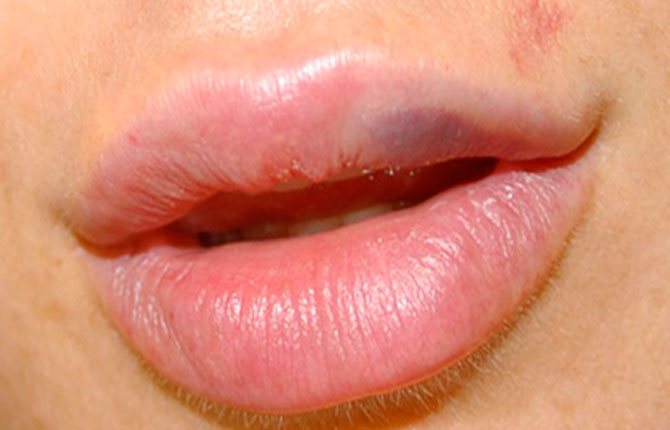
With “closed” injuries there is no risk of infection. It is enough to remove swelling from the lips and get rid of the tumor.
For minor tumors and no open wounds, you can do without medication. Suitable folk remedies:
- Green tea bags. They are dipped in boiling water for a minute, then cooled to a tolerable temperature and applied to the tumor on the lip.
- Freshly cut aloe leaf. The pulp is kept on the affected area at least 2-3 times a day for 5-7 minutes. Aloe provides a complex effect - disinfection, fight against inflammation, pain and swelling.
- Baking soda. It is diluted with warm water to the consistency of thick sour cream. The resulting mass is applied to the tumor area for 10-12 minutes, then washed off. The method is not suitable for dry and sensitive skin. Soda dries it out.
- Liquid honey Apply a thin layer to the swollen lip, keep for 20-25 minutes, rinse off. The procedure is repeated every 4-5 hours.
Allergic reaction
It is necessary to identify the allergen and, if possible, isolate the victim from it. Next, the doctor, depending on the severity and severity of the reaction, selects appropriate antihistamines. They are divided into two large groups – those intended to combat the manifestations of seasonal allergies and “quick-acting” remedies. The first ones are prescribed if it is not possible to avoid contact with the allergen; a course of treatment is required. The latter immediately relieve the most acute allergy symptoms.
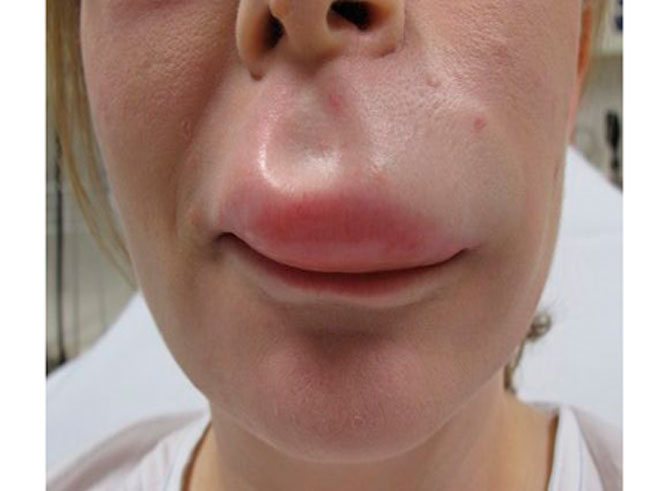
An allergic reaction on the lips often looks simply terrifying and seriously threatens health.
Inflammatory process
Most dental and surgical operations require anesthesia. A swollen lip after it is normal. Moreover, swelling does not appear immediately; it occurs approximately 30-40 minutes after the injection. An hour or two after visiting the doctor, it disappears.
If the cause of inflammation is poor quality work by a dentist or surgeon, the error should only be corrected by a doctor of the same profile. Under no circumstances should you hesitate. Otherwise, the pus that accumulates in the tumor can enter the brain, and this is fraught with serious complications and even death.
In this case, it is useless to rinse and rinse your mouth on your own. Fluid and pus accumulate under the skin, closer to the bone or periosteum. Only if the treatment required suturing, the doctor prescribes antiseptics (chlorhexidine).
Other infections require complex therapy. A tumor on the lips in this case is a concomitant symptom. If you get rid of the “main” disease, this problem will disappear by itself. The doctor prescribes antiviral drugs. In the presence of purulent wounds and ulcers, their simultaneous treatment with Levomycetin and Akriderm is required.
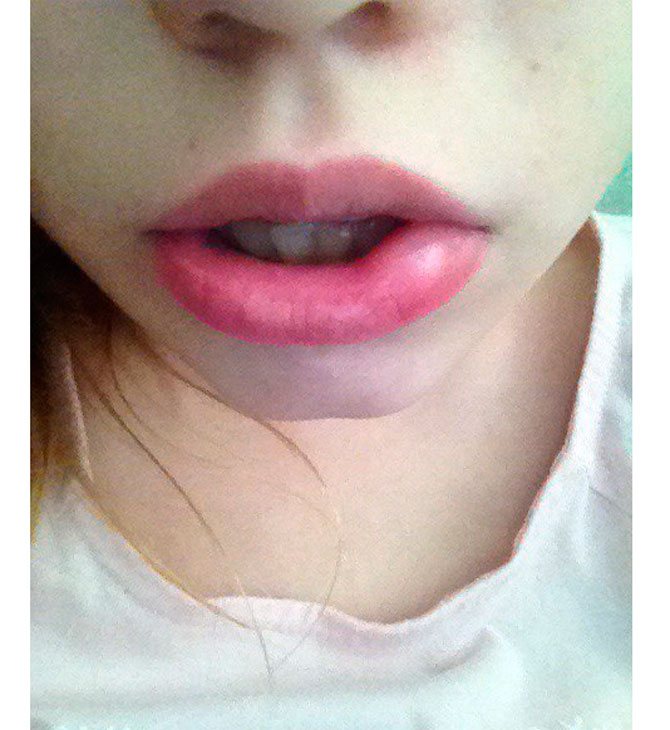
If any infection develops, self-medication is strictly prohibited.
Cosmetology procedures
A slight swelling on the lips after injections made by a cosmetologist is a natural reaction of the body to punctures and tissue damage. If the procedure was performed correctly, the tumor disappears without a trace over the next 4-7 days. When this does not happen, the risk of developing herpes, infection, and infection with a pathogenic fungus increases.
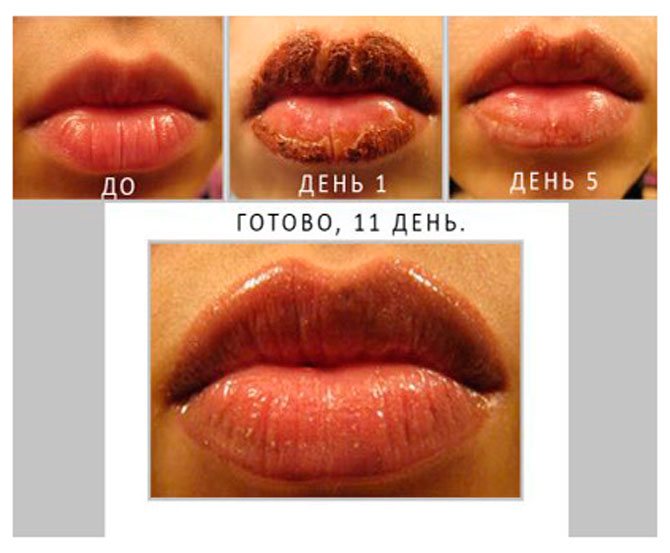
Permanent makeup is a popular service in beauty salons. Essentially, it's the same tattoo. It is to multiple punctures that the lips react with swelling.
The reasons for such swelling are failure to maintain sterility during the session, the needle getting into a blood vessel, a nerve, improper distribution of the drug under the skin or its “migration”. Only a dermato-cosmetologist can determine what is the matter in this case. He also prescribes treatment. The specialist’s recommendations will have to be followed strictly. Additional “sacrifices” may be required, for example, quitting smoking.
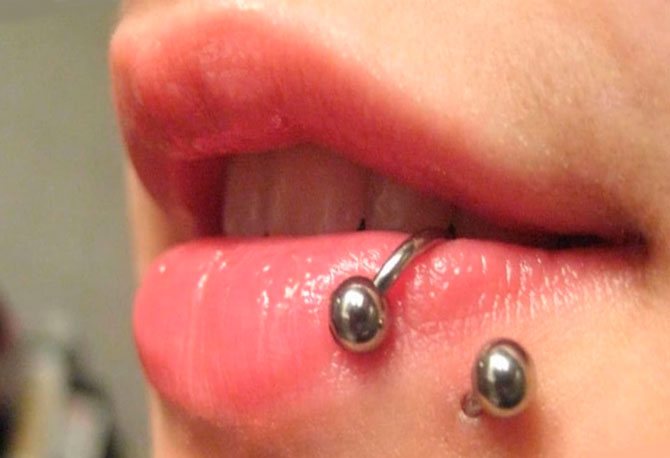
Infection after piercing may be caused by both the master who did not maintain sterility and the client who neglected his instructions regarding the care of the piercing.
Herpes
It is necessary to fight the virus both from the inside and the outside. Antiherpetic drugs in tablets (Zovirax) are prescribed for oral administration. The “bubbles” that have already appeared are treated with ointment (Gerpevir, Acyclovir). They quickly dry out the sores and leave no traces behind. The frequency of taking medications, applying ointment externally and the duration of treatment are determined individually.
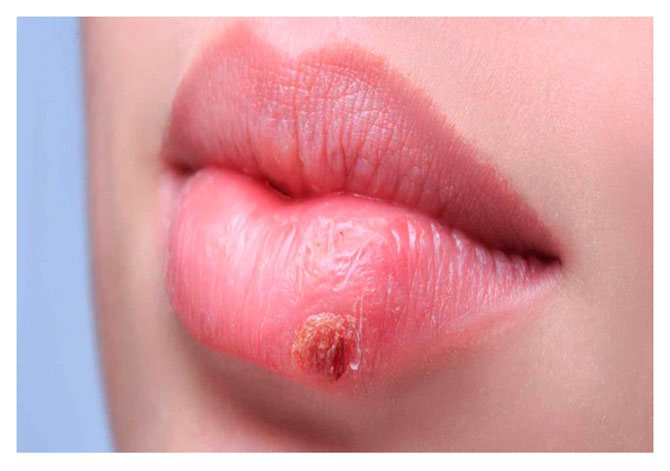
Herpes on the lips often accompanies colds, flu, and other diseases that weaken the immune system.
If herpes is not dealt with, serious complications are possible:
- constant relapses;
- lip deformation;
- change in skin color;
- deep scars, cicatrices;
- transformation of the transparent contents of the “bubbles” into purulent, development of phlegmon, abscess (secondary infection);
- “degeneration” into malignant tumors (lip cancer).
Stomatitis
Requires strict adherence to diet. Alcohol and any hot or spicy food are prohibited. For local anesthesia, the doctor prescribes Dentinox-Gel, Kamistad. To cope with the disease, depending on its etiology, antibiotics, antiviral or antifungal drugs are used. The dosage and duration of the course are determined individually.
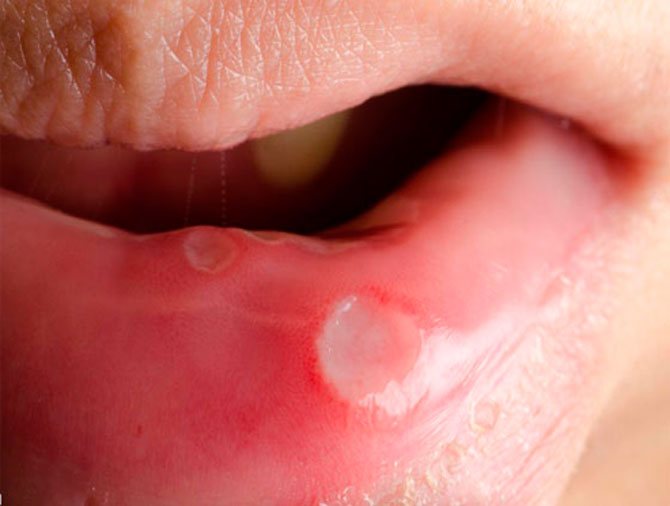
It is not difficult to identify stomatitis yourself. But trying to treat it yourself is a bad idea.
Erysipelas
This disease requires treatment with antibiotics. Erythromycin, Amoxicillin, Benzylpenicillin are prescribed. A tumor on the lip is regularly treated with antiseptics. When erosions appear, compresses moistened with a solution of furatsilin and chlorophyllipt are necessary. At the granulation stage, creams, gels, and ointments are applied to the affected area to stimulate tissue regeneration.
A swollen, swollen lip looks very unsightly and causes physical and psychological discomfort. The effectiveness of treatment depends on the measures taken. It is strictly forbidden to “prescribe” medications and folk remedies for yourself; this must be done by a doctor.
Video: What to do if your lip is swollen, and why does swelling occur?
What could it be
Lips can swell unexpectedly and for unknown reasons. Most often, one lip is affected, unevenly, and this pathological condition immediately catches the eye. Swellings can have different appearances, depending on their origin.
In some cases, lip swelling may indicate life-threatening conditions such as an anaphylactic reaction, which should be immediately assessed as an emergency. If you, or someone else, has any of the following symptoms, seek medical help immediately (call 03):
- Bluish coloration of lips or nails;
- Feeling of throat thickening;
- Fever with redness in tender areas;
- Large swelling (swelling);
- hives or rash;
- Intense disasters;
- itching in the throat or mouth;
- Lip swelling from the moment of injury on the lips or face;
- breathing problems such as shortness of breath, difficulty breathing, wheezing, shortness of breath, and choking;
- Sudden or severe swelling;
- Swollen tongue.
Why does swelling occur?
When swelling suddenly appears on the lip, the question arises what it could be. It is difficult to clearly understand the reasons for this condition, since they can be completely different depending even on the location of the edema. Sometimes these are understandable and objective circumstances, but it happens that such a phenomenon only serves as a signal of more serious health problems.
Most Likely Root Causes
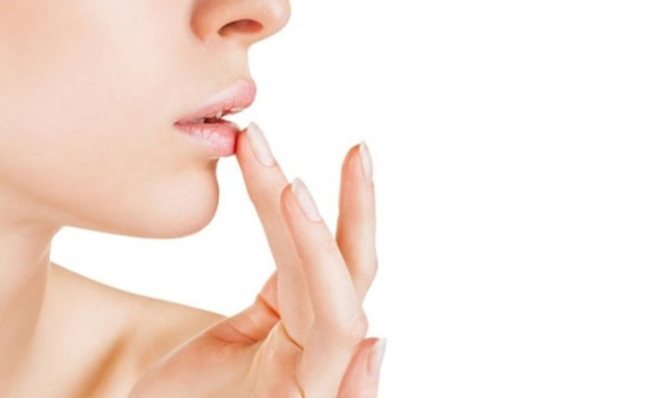
Let's start with what most likely causes the lip to swell in a short time:
- Lack of necessary oral hygiene;
- Pathologies such as stomatitis or herpes;
- Various viral and infectious diseases;
- Reaction to food, animal hair, medicines, household chemicals and other allergens;
- Venereal diseases;
- Bad habits, for example, constantly biting your lip;
- An inflammatory process caused by a crack or a wound near the mouth can also be triggered by a boil or a pimple on the face;
- Thrush, a violation of the intimate microflora in women;
- Dental problems - periodontitis, gumboil, periodontitis and others;
- Consequences of plastic surgery.
Other possible sources of the problem

If nothing from the above list answers the question of why the upper lip or its other part is swollen, perhaps these are the following reasons:
- Reaction to drafts, hypothermia;
- Frostbite;
- Low-quality decorative cosmetics - lipstick, caring lip balm;
- Consequences of dental intervention;
- Animal and insect bites;
- Damage to the soft tissues of the jaw when using dental floss or toothpicks;
- Piercing, tattoos made in the lip area;
- Burn - thermal, chemical;
- Tissue injury during eating;
- Other injuries to the facial area - as a result of a fall, blow;
- Reaction to teething.
If your lip is swollen, first analyze what you have been eating and drinking lately, and whether you have started using new cosmetics or personal hygiene products. In any case, it is recommended to seek professional help; a specialist will certainly determine the source of the problem and give useful recommendations.
Symptoms
In order to find out the cause of swelling, it is necessary to identify and compare all the signs:
- With a herpetic rash, a slight itching and tingling sensation appears at the very beginning of the disease. After a few hours, the affected area swells slightly and over time, small blisters appear on it.
- During an allergic reaction, the skin begins to itch or simply feels distended. In addition, signs such as redness, rash and peeling may appear.
- With severe trauma, a hematoma or open wound will most likely form.
- If the swelling is of infectious origin, then symptoms such as itching, white plaque, redness, bleeding and peeling of the skin appear.
- If the tumor is malignant, there may be no characteristic symptoms at first. To the touch, the malignant neoplasm has a dense consistency.
Lip swelling, how to remove it. Causes and signs of swelling
Swelling of the lips is a pathological condition that occurs as a result of inflammation and the accumulation of large amounts of fluid in the tissues. The swelling is often one-sided (half of the upper lip is enlarged), but there are cases of diffuse swelling of the chin, cheeks, and tongue. Swelling appears in the morning or suddenly in the middle of the night. There are a number of factors that cause such a defect.
Allergy
Poor quality food and cosmetics are the main culprits of lip swelling. Allergic manifestations are associated with the chemical components of lipsticks, foundations and powders. Children are often brought to the doctor with contact allergies on the lips - the child decided to play with his mother’s lipstick. Toothpaste that the whole family uses can cause internal lip swelling. Older people suffer from new plastic dentures.
Symptoms:
- Feeling of itching and burning.
- The skin around the lips begins to turn red, and cracks may appear in the corners of the mouth.
- Rash in the form of small blisters with clear liquid. If treatment is not timely or if the allergen is constantly exposed, the blisters burst, and pathological microflora may join.
- Urticaria often occurs with the formation of blisters up to 5 mm in diameter.
Stomatitis
Burns, infections, mechanical trauma to the oral mucosa cause inflammation, the formation of aphthae and ulcers. The lower lip is a typical location of stomatitis. Slight redness and swelling appear on the mucous membrane. The affected area will be very itchy and painful. Over time, a pale ulcer with a red rim forms, which is covered with a white coating on top. If your lower lip suddenly swells, this may be a sign of stomatitis.
Mechanical damage and inflammation
- As a result of physical trauma (bruise, strong biting, piercing, squeezing out pimples), the mouth may swell with the formation of bruises.
- Cosmetic manipulations (tattooing, plastic surgery, youth injections, fillers) lead to serious consequences if performed incorrectly.
- A lip bruise can be complicated by infection.
- Against the background of ARVI, colds, accompanied by high body temperature, swelling, microcracks, and peeling appear.
- Low qualifications of the dentist, incorrect placement of fillings, and violation of antiseptic procedures lead to inflammation of the periosteum, gums and swelling.
- If the upper lip is swollen with the formation of a group of blisters after hypothermia, this is a clear sign of herpes.
- Burns from eating hot food and drinks.
- Insect bites lead to lip enlargement.
Serious symptoms that may indicate a life-threatening condition
For different diseases, swelling can manifest itself in different ways. But there is a common symptom - lip enlargement, swelling, skin tension.
In this case, the swelling can have different localization:
- upper or lower lip only;
- symmetrical damage to both lips;
- focal swelling - the tumor appears in a small area of one lip.
In addition, redness, blisters, and suppuration may appear on the mucous membrane or skin. These signs indicate an inflammatory process.
Swelling of the lower lip The most common symptom is stretching or enlargement, which can be both painful and accompanied by itching. In extreme cases, it can make it difficult to eat, drink, or talk.
Other symptoms that may accompany swollen lips include blistering, peeling, pain, redness, numbness, headache, chills, purulent discharge (dark or yellow), watery or itchy eyes, runny nose, discoloration of the lips, or general tiredness.
Causes of swelling of the lower lip
The simplest and fastest way to eliminate swelling in the first hours is ice, which should be applied to the swollen tissue, wrapped in a napkin or bandage. This compress must be applied for 15 minutes, otherwise there is a high risk of hypothermia. It is recommended to repeat the procedure after 2 hours.
To disinfect and eliminate swelling of the lips, you can use hydrogen peroxide, which should be applied to cotton wool and applied to the tumor. Such lotions should be done every 3 hours and unpleasant symptoms such as burning and tingling may appear.
Symptoms of hematoma on the lip
The main symptom of a hematoma is the appearance of a painful swelling in the area of injury, as well as a feeling of fullness in the damaged area. Depending on how much blood is shed, as well as what its coagulability is, what the victim’s blood pressure is and how elastic the tissue surrounding the hematoma is, the size of this formation depends.
Due to the fact that there is a lot of loose fiber in the tissues localized in the lip area, the hematoma can reach significant sizes. In the case when it is located on the surface, swelling is very evident, fluctuation is also determined and the functions of the lips and oral cavity are partially impaired.
It should be noted that the general condition may remain unchanged, however, during the period of resorption of the hematoma, the body temperature can rise to 38 degrees. In the case when the hematoma suppurates, patients complain of severe pain and an increase in temperature up to 40 degrees, and swelling also increases greatly. See first aid for a bruised lip.
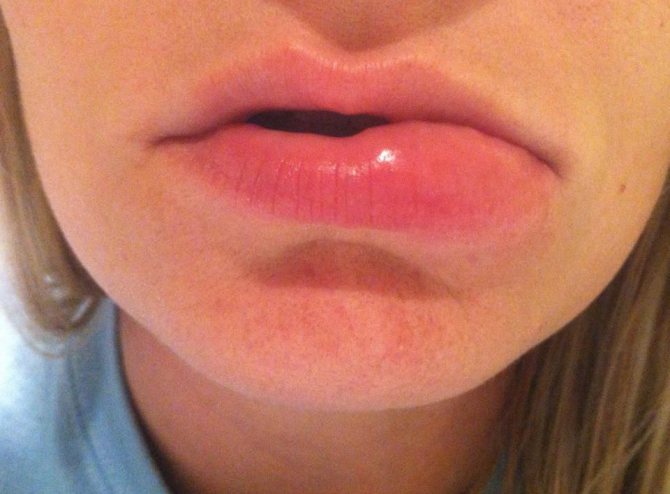
Treatment of hematoma on the lip
In the first days of treatment, the patient is recommended to apply cold compresses to the injured area. As a rule, ice compresses must be applied several times at regular intervals of every 15 minutes to avoid frostbite of the tissues.
Bodyaga, which comes in powder or gel form and is sold in pharmacies, is quite helpful in treating hematomas.
For mechanical damage to soft tissues, lead lotions made from special lead water, which can also be purchased in pharmacies, have worked well, as well as any ointments for bruises that do not have a warming effect.
When treating hematomas, experts recommend physiotherapeutic procedures, paraffin therapy, UV irradiation, diathermy and solux.
In the case when a hematoma on the lip suppurates, surgical intervention is necessary. Surgery is also necessary when scar formation or hematoma calcification, since such pathological processes can disrupt the normal functioning of the lips and oral cavity.
When large non-absorbable hematomas form, punctures are performed, after which an antibiotic solution is injected into the resulting cavity.
Traditional methods of treating hematoma on the lip
1. The best remedy for hematoma is cabbage leaves. Traditional healers recommend applying them to the injured area, changing them twice a day (secured on top with strips of adhesive tape).
2. Honey and aloe are also considered an indispensable remedy for hematomas. Aloe is crushed and mixed with honey, after which it is applied to the affected area. Of course, such procedures are not recommended for those victims who are allergic to honey.
3. A mixture of wormwood, honey and castor oil. The herb is crushed and then mixed with the other ingredients in equal quantities. This ointment is applied to the site of the injury for 15 minutes twice a day until the symptoms are completely eliminated.
4. A decoction of wild rosemary flowers. To prepare it, you need to take 10 grams of herb and pour a glass of boiling water over it, then simmer over low heat for 15 minutes, then cool completely and strain. Traditional healers recommend gently rubbing the resulting decoction into the hematoma area twice a day.
5. An excellent folk remedy for hematomas is potato starch. It must be diluted with water to a paste-like state, and then applied to the injured area. They say that in a couple of days there will be no trace left of the ugly bruise.
6. And finally, an excellent remedy for bruises is... banana peel. It must be applied to the affected area for 30 minutes several times a day.
Herpes infection
The most common cause of lip swelling is herpes. Scientists have proven that 80% of the world's population has the herpes virus.
In fact, it does not pose a great danger, but when the immune defense weakens, this virus is activated, as a result of which lesions may appear on the lips and other parts of the body.
Herpes can be recognized by the following signs:
- the appearance of slight itching, tingling, burning sensation, tingling;
- the occurrence of redness, swelling and swelling;
- formation of bubbles and blisters;
- After the blisters burst, a dense crust forms on the skin.
During the healing stage, these crusts gradually fall off and the scars heal. It is better to treat herpes at the first stage. In this case, local ointments will be effective. The most effective and popular drugs are Acyclovir and Zovirax, as well as other local medications containing clotrimazole and acic. However, unfortunately, it is impossible to completely get rid of the herpes virus.
Prevention
The most common preventive safety measure concerns careful adherence to personal hygiene rules, as well as the use of only high-quality, proven cosmetics. In addition to this, it is recommended:
- follow the rules of a healthy lifestyle and strengthen your immune system;
- avoid stressful situations and prolonged serious experiences;
- adhere to the rule of alternating work and proper rest;
- use the services of trusted, responsible dentists and cosmetologists;
- Avoid eating foods that cause allergic reactions in advance;
- prevent cracking of the skin of the lips and the formation of external wounds, which most often occurs in the frosty season.
The willingness to regularly wash your hands with soap will eliminate the risk of harmful and dangerous infections entering the oral cavity. If you have the slightest suspicion of a disease, you should consult a doctor for professional advice and the necessary help.
Possible complications
Untimely or incorrect treatment of the causes that provoked the swelling or part of it can lead to:
- lip deformation;
- regularly occurring relapses of herpes;
- the development of inflammatory processes and the formation of purulent discharge;
- formation of scars and cicatrices on the skin.
If the pathology does not go away for a long time, which may cause the skin color to change, then you should consult a doctor to confirm or refute:
- the presence of Quincke's edema, in which the swelling spreads to the face, neck, larynx and trachea, causing respiratory arrest (emergency medical care is required);
- the addition of a secondary infection, which is dangerous by the development of an abscess (purulent lesion) or phlegmon, which can only be treated surgically;
- transformation of a tumor into an oncological disease (lip cancer).
If the cause of the swelling is not identified in time and treatment is not started, there is a high risk of developing dangerous complications. If lip swelling is allergic and is not treated properly, Quincke's edema may develop, which is life-threatening for the patient.
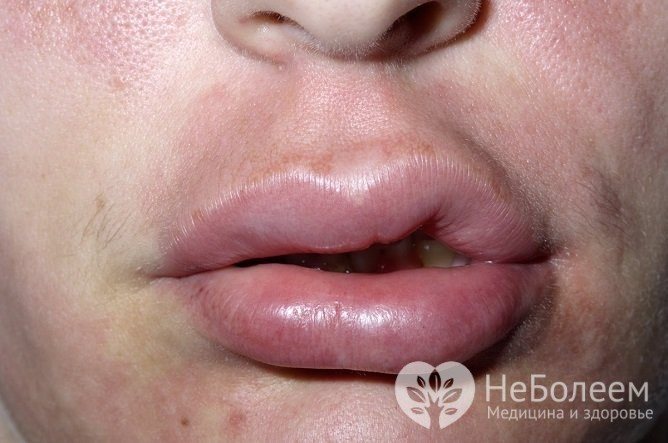
With punctures in unsterile conditions and piercings, infection can penetrate into fresh wounds. The consequences of this pathological condition often include unsightly and large scars, as well as blood poisoning.
Tips for treating and preventing lip swelling
For whatever reason, lips and areas of facial skin are swollen, you should not start treatment without consulting a doctor and proper diagnosis. Usually, inflammation of the upper or lower lip goes away quickly, but in order not to disrupt this process and not to aggravate the condition, you must follow a number of rules:
- open wounds cannot be treated with ointments and compresses;
- for closed injuries, warming compresses and ointments should also not be used;
- in the first hours after injury, you should not eat food;
- during the period of healing of wounds and treatment of edema, you should eat exclusively warm food, you should not eat salty and spicy foods;
- If your lip is inflamed, you should not use cosmetics.
The healing of the piercing must be taken responsibly; you must strictly follow the specialist’s instructions and monitor your condition. It is better to be scrupulous when choosing a salon and a specialist: the procedure must be carried out with skillful hands and in sterile conditions.
When an infection enters the piercing hole, the lips become swollen, painful, and itchy. If such symptoms develop, you should consult a doctor, especially if the temperature rises and swelling appears in the area of the lymph nodes.
Cracks and jams appear as a result of chapped lips, against the background of a cold, as well as due to endocrine disorders and a lack of certain vitamins in the body (which only a doctor can determine based on tests). They are treated with antiseptics and anti-inflammatory drugs.
The development of vitamin deficiency and predisposition to colds and viral infections will be prevented by proper nutrition and hardening. The body's ability to restore damaged tissues also directly depends on the immune system. In winter, sensitive lip skin should be treated with nourishing balms and masks.
If your lips swell inside for no apparent reason, you should immediately consult a doctor. Swelling may indicate the presence of hidden internal pathologies, which only a doctor can identify and cure.
Source: StomaGet.ru
Treatment with drugs
Treatment depends on the cause of the symptom.
- Swelling caused by infection of a wound, abrasion, or pimple is first treated with antiseptics - hydrogen peroxide, iodine solution, Chlorhexidine. Then anti-inflammatory ointments are applied to the affected area - tetracycline, erythromycin, oxolinic, as well as Flucinar and Sinalar.
- Swelling that appears as a result of an allergic reaction is treated by taking antihistamines - Zodak, Zyrtec, Cetrin, Suprastin. Antipruritic, antiallergic, and anti-inflammatory ointments are used as local therapy. Suitable for these purposes are Flucinar, Prednisolone, Fluorocort.
- After lip augmentation injections or permanent makeup procedures, it is recommended to apply a cold compress for 2-3 days.
- If the cause is fluid retention in the body, diuretics or diuretics are taken.
- Hematomas and bruises leading to a tumor on the lip will be cured by badyaga. It is mixed with water and applied to the swollen area (or purchase a ready-made gel). Sinyak off, Lyoton, Rescuer, Troxevasin are suitable for the same purposes.
- A burn on the lip, which causes swelling, is treated with Levomekol ointment. It will disinfect the affected area and relieve pain. Solcoseryl and Rescuer are used as burn-relieving ointments. Be sure to regularly treat the burned area with antiseptic drugs.
- Stomatitis and other inflammatory diseases of the oral cavity are treated by rinsing the mouth with an antiseptic (Furacilin, Chlorhexidine, 1% Clotrimazole solution, Miramistin, weak manganese solution). Also used for therapy are Stomatidin, Lugol, Hexoral sprays. They are also good antiseptics. To combat bacteria, fungi and viruses, the gel Cholisal, Viferon, Lidochlor, Komistad is used. The products eliminate inflammation, relieve pain and fight microbes in the oral cavity.
- If the cause of the swelling is herpes, then antiviral drugs and ointments are prescribed. Usually the swelling is accompanied by itching and tingling. Then redness and small blisters appear, uniting with each other. Occurs due to weakening immune functions. It is not possible to completely overcome the virus and remove its cells from the body. However, there are remedies that will help achieve long-term remission. These are: Acyclovir ointment, Zovirax, Gerpevir. They not only have an antiviral effect, but also quickly relieve itching, burning, inflammation and pain. To quickly regenerate tissue, Bepanthenol and Solcoseryl are prescribed. Activities to strengthen the immune system are also important here.
The ointments are applied to the lip by soaking sterile gauze or bandage with them. This will prevent the product from entering the oral cavity and gastrointestinal tract.
If you find a tumor on your lip, it is better to go to the doctor and get examined. Based on the results obtained, the doctor will determine the cause of the symptom and prescribe treatment.
Etiology
The main reason for the development of lip swelling is an allergic reaction. It is called after contact with an allergen. These can be food components, environmental factors, medicines, and household chemicals.
There is usually a hereditary predisposition. Also, one of the reasons may be contact with an allergen on the surface of the skin, i.e. This is the application of cosmetics or medications used on the face or mouth.
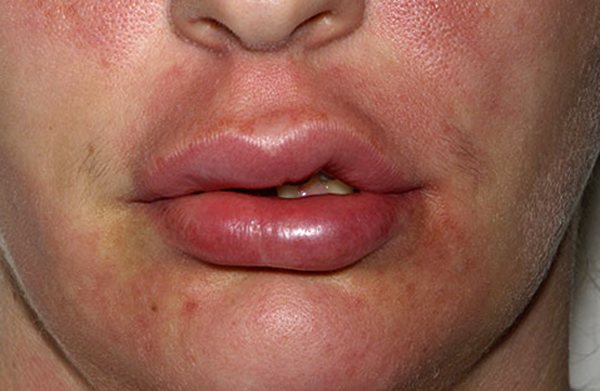
Swollen lips: what to do
The best decision if your lips are swollen is to visit a doctor. Even the most seemingly insignificant problems can be dangerous to human health. The bloating itself is not a threat, but the reason that caused it can harm you. For example, the spread of infection, frequent suppuration, ulcers on the damaged area, aggravation of the condition due to the addition of other infectious flora. Only a specialist will be able to tell you as correctly as possible what to do if your lip is swollen.
Swelling of the lip is a natural reaction of the body to physical impact on this part of the body. This is an obvious problem that is relatively easy to fix. You should know how to remove a swelling from the lip after a blow in order to prevent infection and suppuration. Swelling will occur almost immediately after the injury, accompanied by a violation of the integrity of the skin and mucous membranes. If you were hit and your lip is swollen, what to do:
- First, apply a compress (hot/warm) to the injury site. To stop the flow of blood to the damaged area, it is also possible to use a cold option. It should be applied not to the wound itself, but to the area of skin adjacent to it.
- If the integrity of the skin is damaged, it is recommended to treat the wound with hydrogen peroxide and any agent that will promote healing.
- Lips have very delicate, thin skin, so serious injuries can lead to changes in appearance (attractiveness). If you notice that an injury has resulted in loss of contour, should you seek immediate medical attention? .
People who suffer from this disease immediately suspect herpes when their lips become swollen. Before the appearance of herpetic blisters, inflammation occurs and pain increases. Herpes can occur equally on the lower lip or upper lip, but more often it appears in the corner of the mouth. After a day, a blister typical of the disease forms with a translucent liquid inside. It is strictly forbidden to squeeze or crush the tumor.
The maximum effectiveness of special products is noted if you start using them when the lip has just begun to swell. As a rule, people use Acyclovir, Herpevir, Zovirax, which contain components that destroy the manifestations of the herpes virus, help reduce pain, and have a healing effect.
- Quincke's edema - symptoms and treatment at home
- Swelling of the throat - causes of occurrence in children and adults, first aid and drug therapy
- Hyaluronic acid on lips - pros and cons
Lip bite
A person is accidentally able to bite his own lip, breaking the integrity of the tissues. This leads to the fact that it can swell, begin to hurt, and in some cases complications begin. Tissue damage opens the door to infection, triggering an inflammatory process, which is accompanied by the accumulation of substance inside: discharge, pus, clear liquid. Lip biting is not dangerous to humans in most cases, but can sometimes pose a health hazard.
If you bite your lip, don't ignore this fact. Take advantage of the available means to prevent the development of inflammation:
- treat the wound with peroxide;
- apply iodine solution;
- drink still water to saturate and moisturize the mucous membranes.
Swells for no reason
In rare cases, a person develops a tumor on his lip suddenly and for no apparent reason. This does not mean that it just started to swell; rather, you simply don’t know what prompted the bloating. If your lip is swollen for no reason, you need to analyze your recent actions and find out why this reaction occurred.
Your lip may become inflamed after anesthesia at a dentist appointment; you could have been bitten by a mosquito, which became a carrier of infection. In any case, there is a reason for this manifestation, but you cannot find it. An allergy, for example, can begin suddenly in an adult. If the tissue continues to swell or hurt, contact a specialist immediately. He will be able to find out the cause of the symptom and tell you what to do.
- Dry mouth
- Causes of irritation in the labia - how to quickly relieve inflammation
- Burning in the intimate area in women
In the morning
This problem can be permanent or isolated, but its cause should be found out in any case. Lips become swollen in the morning, for example, due to a large amount of liquid drunk the night before. Problems can be solved very easily by reducing the amount of water/tea before bed. The cause may be an allergy that has recently developed.
The child has
This problem creates additional difficulties due to the fact that the baby cannot always correctly, accurately describe his feelings, or reconstruct in sequence the events of several days, which could lead to the child having a swollen lip. What to do if your baby’s lip is swollen:
- Reconsider your breastfeeding tactics. Inflammation occurs due to improper attachment of the baby, which leads to the formation of calluses in the oral cavity.
- The child is more susceptible to stomatitis, so you should carefully examine the inside of the mucous membrane, cavity, or consult a dentist.
- Parents may not yet know about their child’s allergic reactions, so this is often one of the reasons for swelling. In this case, you need to do the following: remember what was eaten the day before and exclude these foods from the diet, and then add them back one by one and monitor the reaction. Antihistamines are suitable to relieve swelling.
- Acute respiratory diseases are more pronounced in children. One of the symptoms in the initial stage will be swelling of the lips. Children should be treated only according to the regimen prescribed by the pediatrician.
- Children are clumsy at an early age, so they may accidentally split or bite their lip, causing swelling.
If you feel that inflammation has begun on the inside of the lip, as a rule, this indicates the development of periostitis, gingivitis, and stomatitis. The symptom is accompanied by inflammation, deterioration of the person’s condition and threatens to spread the infection deeper into the human body. Any injury to the mucous membrane, poor-quality dental procedure, or poor oral hygiene can lead to swollen lips due to infection.
It is not worth doing something about this problem yourself, because you will not be able to determine the root cause. Sometimes the symptom may appear due to an infection from within the body. If the source of inflammation has formed in the mouth, then the spread of the disease along with the bloodstream should be prevented. The correct treatment must be prescribed by a dentist or therapist.
After anesthesia
Most dental procedures require an injection of anesthetic to prevent pain. Often they cause an allergic reaction, which leads to a swollen lip after anesthesia. In this case, the external manifestation occurs quickly, swelling is noticeable within 30 minutes after the injection.
If swelling appears the next day after the procedure, in addition to the swelling, you feel that the lip is being pulled to the side, then an infectious complication is likely. In such cases, in addition to the main visual sign, pain will be felt at the injection site, along the nerve fiber. The swollen area will be dense and hot to the touch, chills, nausea, and dizziness are possible. It is not recommended to do anything on your own; your treatment should be handled by a specialist.
This symptom has varying intensity of inflammation. Sometimes a person notices that the lip is swollen on one side, and sometimes the entire upper or lower one. This indicates the intensity of the processes occurring, the degree of inflammation, for example:
- Herpes, as a rule, causes swelling only at the site of growth of the herpetic vesicle and is accompanied by pain.
- If the lip is completely swollen, then an allergy or infection is more likely.
- In a small child, the cause of swelling on one side may be “dropsy,” which has formed due to improper breastfeeding.
Swollen lip in an adult: causes and treatment
Lips swell for a variety of reasons, so establishing the nature of this phenomenon on your own is quite problematic.
Injury
Lip injuries are common among boxers. But even people who are far from practicing martial arts are not immune from blows and other injuries, after which the lip may swell:
- bruise - from a fall, impact;
- biting teeth - accidental or due to orthodontic defects, neurological pathologies, grinding teeth in sleep, habit of biting nails;
- tattoo or piercing – the possibility of infection of the wound surface;
- burn of the lip from the inside or outside by hot food, steam or sunlight;
- cracks and jams - with internal pathologies, biting and chapping;
- dental procedures - accidental injury to areas of the lips inside the oral cavity with dentist instruments during dental treatment, a reaction to surgical intervention when cutting the frenulum.
If a traumatic factor causes a sudden increase in volume, thickening, or blueness of the lip, but the skin remains unharmed, it is necessary to apply ice to the sore spot as quickly as possible. The ice cube must be wrapped in cloth or gauze to avoid hypothermia.
Ice compresses are applied to the site of swelling for 10–15 minutes every 2–3 hours in the first two days after injury. This is usually enough to significantly reduce swelling on the lip and reduce pain.
Absorbable ointments, for example, Badyaga, Rescuer, and folk remedies - aloe lotions, bags of cooled tea leaves, chamomile or oak bark decoction will finally help cure swelling. If the swelling does not subside after a few days, it is better to see a doctor.
In case of an open injury, when after a blow not only the upper or lower lip is sharply swollen, but also tissue rupture occurs, you urgently need to rinse the wound with hydrogen peroxide to clean it of germs and stop the bleeding. Then you need to treat the damaged area with a disinfectant, for example, Dioxidin. This treatment should be done every 2-3 hours until bleeding occurs.
If the lip is deeply damaged, especially if the frenulum is affected, the victim should contact a traumatologist as soon as possible to disinfect the wound and, if necessary, apply sutures.
Dental problems
With some diseases of the teeth and gums, as well as during their treatment, the lips may swell, both from the inside and the outside. Against the background of pain in the teeth of the lower jaw, the lower lip may swell due to:
- caries;
- stomatitis;
- periodontitis;
- periodontal disease;
- periostitis;
- phlegmon;
- flux;
- abscess.
With similar processes in the upper jaw, the upper lip sometimes swells and swells.
The cause of lip swelling can be the treatment of dental diseases: accidental injury with an instrument, a reaction to the administration of an anesthetic, or swelling after complex surgical interventions in the oral cavity.
Another option for why the upper lip hurts, turns red and swells may be associated with a visit not to the dentist, but to a cosmetologist for the purpose of injection lip augmentation. Damage to a blood vessel as a result of an unsuccessful injection can lead to a hematoma with swelling. An individual reaction of the body to the administered drug is also possible.
Allergic reaction
Redness and swelling of the lip are a common symptom of allergies. The body can react in this way to a variety of allergens:
- plant pollen;
- food ingredients;
- components of medicines, cosmetics and perfumes;
- insect bites;
- household chemicals.
As soon as it becomes clear that your lips are swollen due to allergies, you need to take an antihistamine as quickly as possible. Any allergic swelling on the face is dangerous because it can spread towards the throat. This is how life-threatening angioedema develops. Therefore, your home medicine cabinet must contain some kind of drug to combat allergies:
- Diazolin.
- Suprastin.
- Tavegil.
- Zodak.
- Fenistil.
- Claritin.
- Clarotadine.
- Diphenhydramine.
- Erius.
If your lip is suddenly swollen due to an allergy, you should urgently take an age-appropriate dose of one of these medications and consult a doctor. Allergic reactions are especially dangerous for children, so if a small patient is injured, you should call an ambulance.
You can eliminate lip swelling and get rid of itching with the help of non-hormonal ointments and topical gels with antihistamine action: Fenistil-gel, Vitaon, Nezulin, Psilo-balm.
Herpetic infection
Failure of the immune system can occur in every person due to hypothermia, viral infection, stress or overwork. And the result of this failure often manifests itself in the form of a herpetic rash that suddenly forms on the lips under the nose.
If the upper lip is swollen and covered with blisters, it means that the herpes virus has become active in the body. Ointments based on acyclovir will help relieve the symptoms of the disease. At the same time, you can be treated in a traditional way - lubricate the swollen areas of tissue in the area of the nasolabial triangle with tea tree oil, diluted celandine juice or propolis tincture.
If herpetic blisters spread widely and the inflammatory process begins, drug treatment is necessary, which should be prescribed by a doctor.
Herpes can cause serious complications, since the infection spreads not only to the skin of the face and mucous membrane of the oral cavity, but also to internal organs. During the period of exacerbation of the disease, everything must be done to prevent the addition of a bacterial infection. It is necessary to disinfect the affected areas of the facial skin with antiseptics (Chlorhexidine, Miramistin) carefully, avoiding opening pimples and pustules.
Pharmacy products
You need to know what medications are used for swelling, inflammation, what you need to take for healing
Some parents, either out of ignorance or inexperience, use means that can harm the baby. So, with such a wound, it is unacceptable to use antiseptics such as iodine, its derivatives and brilliant green.
- Zinc ointment relieves inflammation perfectly.
- Bepanten helps restore tissue condition.
- The Healing balm will help speed up the healing of abrasions.
- If an infection is present, the antifungal and antibacterial drug Boro Plus is prescribed.
- If there is itching or irritation, La-kri will come to the rescue.
- Solcoseryl will contribute to a speedy recovery, as well as acceleration of metabolism.
- Badyaga gel is used to resolve the hematoma.
If precious time is lost and there is a huge swelling on your skin, you can get rid of it with the help of various ointments and gels. Anti-inflammatory ointments such as Dolgit, Ketonal, Fastum gel, Indovazin and others will help stop the development of hematoma and relieve swelling.
Ointment against bruises and contusions Traxevasin will quickly resolve bumps and lumps. Iodine mesh will relieve subcutaneous hemorrhages. Heparin ointment, being an anticoagulant, thins the blood and perfectly resolves any hematomas and swelling.
A broken lip requires mandatory treatment with antiseptic drugs. Hydrogen peroxide comes first. It can be used if there is an injury to the inner surface of the lip. After a child, man or woman has cut the soft tissue, lubricate the wound with this product.
Hydrogen peroxide does not leave burns; it can be used to treat an open wound surface. The drug immediately has an active effect - bubbles and hissing appear. Disinfection is carried out through the release of atomic oxygen. To treat damaged mucous membranes, a 0.25% solution of hydrogen peroxide is used.
Another effective disinfectant is Miramistin. The main advantage of this drug is the absence of any negative reactions. The product is applied to damaged areas without leaving burns.
With its help, pathogenic microorganisms are actively eliminated and the inflammatory process is eliminated. The drug is used to treat burned tissues, to treat candidiasis, and gynecological diseases.
Potassium permanganate solution is an effective way to wash festering wounds. Be sure to prepare the medicine correctly - add a few crystals of potassium permanganate to a glass of warm water.
A simple and affordable remedy is furatsilin solution. To prepare it, you need to dissolve ten furatsilin tablets in a liter of warm water. Next, you need to smear the medicine on the damaged areas. The prepared solution should be stored in the refrigerator.
What should I use to speed up tissue healing? An effective remedy is an ointment called traumeel. This is a homeopathic medicine that can help eliminate infection, inflammation, and relieve severe swelling.
How to quickly heal injured tissue? Panthenol cream is used for treatment. It helps damaged areas to heal faster, without leaving a scar. Before applying the drug, you need to stop the bleeding and take measures to disinfect the damaged area.
We suggest you read: If the lymph nodes in the neck are swollen, what to do
If necessary, the cut lip is sutured. Panthenol is safe, there are no adverse reactions after use. Lubricate the lip injury with it in the morning and evening until there is no trace left of the hematoma on the lip. The cream is used for external use only.
First aid
Since the disease is life-threatening, it is important to know how to relieve swelling in yourself or someone else.
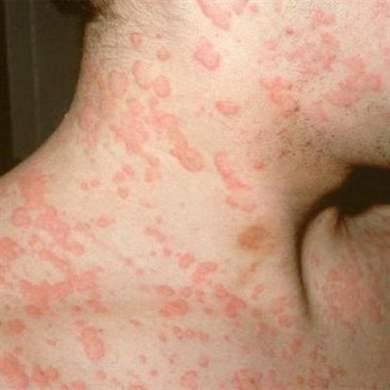
- The first thing to do immediately is, if possible, eliminate the effect of the substance causing such a reaction, make the patient sit comfortably and call an ambulance.
- The second most important thing is to drink plenty of fluids.
- It is very good if it is a warm decoction of herbs with lemon and honey, if you are not allergic to honey and herbs, or warm water with soda (half a teaspoon per glass).
- If there is any antihistamine in the medicine cabinet, for example, suprastin, then it should be given to the patient.
- In case of an insect bite, immediately remove the sting, disinfect and apply a cold compress.
- Give access to fresh air.
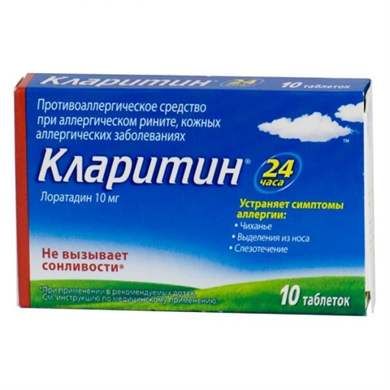
In difficult situations, doctors administer an adrenaline solution to stop the rapidly spreading swelling.
Treatment is prescribed by a doctor. It is usually carried out with antihistamines or hormonal drugs that lower the level of histamine in the blood. First of all, Suprastin, Claritin, Eden are prescribed.
